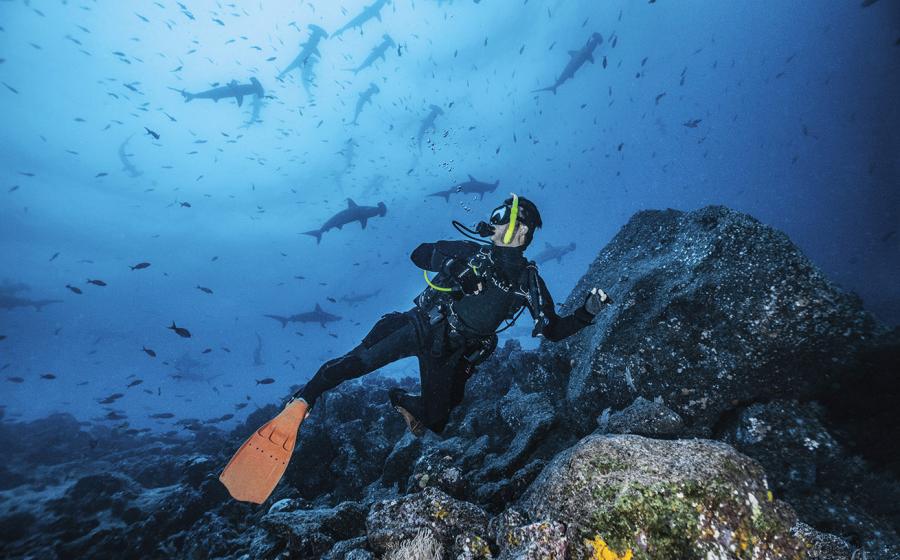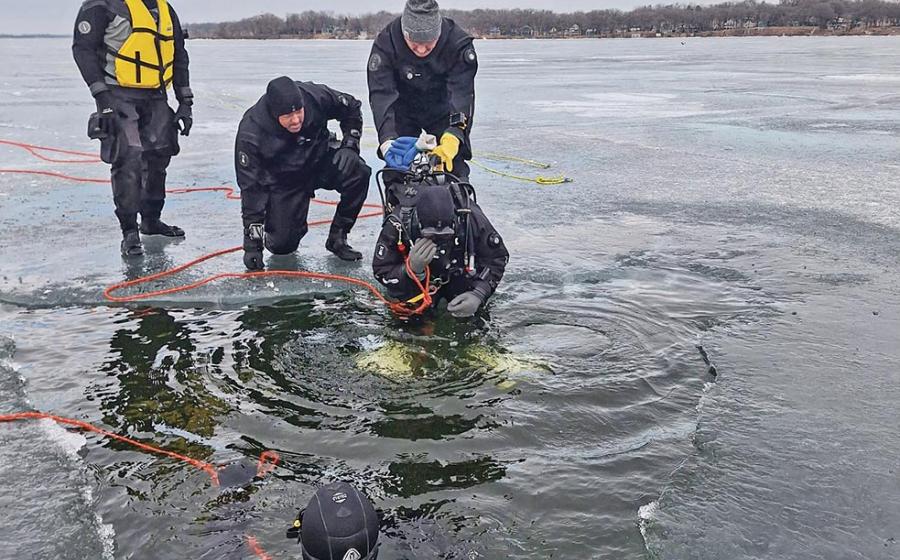Diving with Depression
March 2007
By Selene Yeager
Sixteen years ago, Richard Baker had lost everything, short of his mind--and he didn't seem too far away from losing that too. A traumatic accident left him unable to work. Soon after taking early retirement from his job, his family took early retirement from him. "I lost everything," recalls Baker, now 53. "I was depressed, even though I didn't actually recognize it at the time." Somewhere from the depths, he recalled watching Sea Hunt and marveling at the adventures of Mike Nelson as he floated through deep, shadowy waters in search of downed satellites and sunken treasure. Scuba was something he had always wanted to try. Now he had nothing but time to give it a go.
"The first time I hit the pool, I was hooked," says Baker, now a dive instructor who has logged approximately 2,000 dives. "I find more peace and tranquility while diving than anywhere else. Even a 'bad' dive where the water is cold and I can't see a thing lifts my spirits for three or four days." Baker knew of course that he couldn't spend every waking hour in the water, so he sought medical help and has been on Prozac since 1994, but that hasn't been a problem either. "I have noticed zero side effects with the medication. And the combination of diving and antidepressants in my life has turned my world around."
Respite or Risk?
As anyone who has suffered through it knows, depression can profoundly affect your entire being. People with depression often have difficulty sleeping, fatigue, poor appetite, restlessness, and difficulty concentrating or making decisions as well as hopelessness, sadness and irritability. Obviously, none of those symptoms goes well with diving, a sport that demands focus, attention to detail and awareness of your surroundings. So even if diving may help you feel better, you should take an honest, careful inventory of your current state of mental health before you dive in.
"It could certainly be dangerous to dive with untreated major depression," says psychiatrist and dive researcher David F. Colvard, M.D., of Raleigh, N.C., who counts many active divers among his patients. "You can have measurable slowing of your thought processes and decision-making ability; you can have increased anxiety; you can have extremely low energy, and you can be quite self-absorbed and preoccupied. All of those things make you a greater risk to yourself and those around you."
But not all depression is that severe, and the symptoms of even major depression can be greatly improved with medication, says Colvard. What's more, diving itself is good medicine. "Being able to pursue things that make you happy; being physically active, doing something that makes you feel competent--all those things are part of what can make diving such a positive experience for people who are prone to depression," says Thomas Skalko, Ph.D., director of the East Carolina University Horizons Day Treatment Program in Greenville, N.C. "Diving gives you the hope of a normalized life."
The underwater environment itself has special healing powers, says Nicole Cuomo, Ed.S., school psychologist, counselor and behavior analyst with Behavior Works in Satellite Beach, Fla. "You have the compression from the neoprene and the water, which can produce a comforting and calming effect, and you're completely in the moment with your mind on nothing but the dive, which is very therapeutic."
"The best part about diving is being submerged and surrounded by all these amazing sights and sounds and feelings," agrees Baker. "Your mind doesn't wander when you're diving--it's almost impossible to think about anything but the dive when you're underwater."
Whether or not your depression will interfere with your ability to reach that state of bliss depends on the severity of the depression. "If you are stable and you're sleeping well, eating well, and engaging in your usual activities in daily life, you shouldn't have trouble diving," says Cuomo. "If you've been having serious mood swings, losing your cool or feeling very depressed, it's not the time to dive."
Managing the Meds
Today's SSRI (selective serotonin reuptake inhibitor) antidepressants are a godsend for the nearly 20 million people in the U.S. who will suffer a bout of depression during any given year. For many divers, antidepressants like fluoxetine (Prozac), paroxetine (Paxil) and sertraline (Zoloft) mean not having to abandon diving (not to mention other important activities in their lives) to deal with repeated bouts of depression.
These drugs, however, are not without side effects. They can cause sleepiness, anxiety or restlessness, especially during the first few weeks of taking them, all of which can interfere with your ability to dive safely. So it's important to work with your doctor to find a medication and dosage that works for you and to feel stable on it before you resume diving, says Skalko. "Know the potential side effects of your medications and how they might affect you during a dive." As a rule of thumb, you should not dive for the first several weeks after starting any antidepressant or after changing the dosage of your current medication.
Be especially cautious if you're taking one of the older generation antidepressants like tricyclics and tetracyclics. These are especially potent and are more likely to cause marked side effects like sedation and general health problems like rapid heartbeat that could be dangerous while diving.
One diver notes that she's taken antidepressants since 1988 for recurrent depression with panic disorder. "I'm happy that the SSRIs work with so few adverse effects," says Barbara Dwyer, who dives year-round in the cold, rough waters off Monterey and Carmel near her northern California home. "The older trycyclics caused increased heart rate, profound dry mouth and jitteriness, and I was unwilling to take them. Fortunately, the SSRIs had been marketed recently. The only adverse effect I've had with that class of drug is dry mouth." One precaution Dwyer does take: "If I dive below 120 or 130 feet in cold water or plan a deep cave dive, I use trimix to prevent the narcosis."
Dwyer notes that before getting her depression under control, she had limited herself to recreational diving. "Since then, I've dived more frequently and gone on to dive caves and technical dives that I never would have trained for when depressed or anxious. My doctor and I have discussed this extensively, and she's aware of the kind of diving I do. We agree that diving with an untreated disorder that affects judgment and concentration is unsafe."
Dwyer points out that diving is not for everyone, and that divers who take medication of any kind should first consult their physician and then observe how the drugs affect them at the surface for at least a month before diving with them.
Playing It Cool
Just as someone who is cleared to dive with diabetes or high blood pressure may pick and choose dives that are less likely to aggravate their condition, divers with depression, especially if they are also prone to anxiety, may want to plan their dives to lessen potential stress, says Skalko. "We all do different types of diving depending on our comfort level. Every dive has some measure of risk, some more than others. You need to be very stable and comfortable with the level of risk you're taking. If you've had depression or you're on medication, it makes sense to do some easier diving as you find your own personal comfort level. Always err on the side of safety," he says.
Other Advice
Go slow. If you're new to diving and have depression, find an instructor who will work closely and slowly with you to help you feel more competent and confident, says Baker, an avid cave diver. "Anxiety often arises because you're unsure of yourself. My wife, who has anxiety issues, was told for years that she shouldn't dive. But she took her time and went at her comfort level and today she is a divemaster with over 200 dives under her belt and is extremely comfortable in the water.
Dive another day. It's simple advice we all should follow: If you don't feel right going into a dive, don't dive, says Baker. "If you're not having a good day or you feel anxiety coming on when you're on the surface, just abort the dive. There'll be another one."
Stay fit. Exercise not only helps keep depression at bay, it also helps you feel strong and competent and perform better when you do dive, says Dwyer. "Working out and staying fit is a strong priority, especially because of the level of diving I do," she says.
Check yourself out. Even if the local dive shop doesn't require one, it's a good idea to do an easy checkout dive to acquaint (or reacquaint) yourself with your equipment and dial in your weights and buoyancy before your actual dives. "A good checkout dive can dramatically increase your confidence and comfort level, especially if you're not a frequent diver," says Colvard.
March 2007
By Selene Yeager
Sixteen years ago, Richard Baker had lost everything, short of his mind--and he didn't seem too far away from losing that too. A traumatic accident left him unable to work. Soon after taking early retirement from his job, his family took early retirement from him. "I lost everything," recalls Baker, now 53. "I was depressed, even though I didn't actually recognize it at the time." Somewhere from the depths, he recalled watching Sea Hunt and marveling at the adventures of Mike Nelson as he floated through deep, shadowy waters in search of downed satellites and sunken treasure. Scuba was something he had always wanted to try. Now he had nothing but time to give it a go.
"The first time I hit the pool, I was hooked," says Baker, now a dive instructor who has logged approximately 2,000 dives. "I find more peace and tranquility while diving than anywhere else. Even a 'bad' dive where the water is cold and I can't see a thing lifts my spirits for three or four days." Baker knew of course that he couldn't spend every waking hour in the water, so he sought medical help and has been on Prozac since 1994, but that hasn't been a problem either. "I have noticed zero side effects with the medication. And the combination of diving and antidepressants in my life has turned my world around."
Respite or Risk?
As anyone who has suffered through it knows, depression can profoundly affect your entire being. People with depression often have difficulty sleeping, fatigue, poor appetite, restlessness, and difficulty concentrating or making decisions as well as hopelessness, sadness and irritability. Obviously, none of those symptoms goes well with diving, a sport that demands focus, attention to detail and awareness of your surroundings. So even if diving may help you feel better, you should take an honest, careful inventory of your current state of mental health before you dive in.
"It could certainly be dangerous to dive with untreated major depression," says psychiatrist and dive researcher David F. Colvard, M.D., of Raleigh, N.C., who counts many active divers among his patients. "You can have measurable slowing of your thought processes and decision-making ability; you can have increased anxiety; you can have extremely low energy, and you can be quite self-absorbed and preoccupied. All of those things make you a greater risk to yourself and those around you."
But not all depression is that severe, and the symptoms of even major depression can be greatly improved with medication, says Colvard. What's more, diving itself is good medicine. "Being able to pursue things that make you happy; being physically active, doing something that makes you feel competent--all those things are part of what can make diving such a positive experience for people who are prone to depression," says Thomas Skalko, Ph.D., director of the East Carolina University Horizons Day Treatment Program in Greenville, N.C. "Diving gives you the hope of a normalized life."
The underwater environment itself has special healing powers, says Nicole Cuomo, Ed.S., school psychologist, counselor and behavior analyst with Behavior Works in Satellite Beach, Fla. "You have the compression from the neoprene and the water, which can produce a comforting and calming effect, and you're completely in the moment with your mind on nothing but the dive, which is very therapeutic."
"The best part about diving is being submerged and surrounded by all these amazing sights and sounds and feelings," agrees Baker. "Your mind doesn't wander when you're diving--it's almost impossible to think about anything but the dive when you're underwater."
Whether or not your depression will interfere with your ability to reach that state of bliss depends on the severity of the depression. "If you are stable and you're sleeping well, eating well, and engaging in your usual activities in daily life, you shouldn't have trouble diving," says Cuomo. "If you've been having serious mood swings, losing your cool or feeling very depressed, it's not the time to dive."
Managing the Meds
Today's SSRI (selective serotonin reuptake inhibitor) antidepressants are a godsend for the nearly 20 million people in the U.S. who will suffer a bout of depression during any given year. For many divers, antidepressants like fluoxetine (Prozac), paroxetine (Paxil) and sertraline (Zoloft) mean not having to abandon diving (not to mention other important activities in their lives) to deal with repeated bouts of depression.
These drugs, however, are not without side effects. They can cause sleepiness, anxiety or restlessness, especially during the first few weeks of taking them, all of which can interfere with your ability to dive safely. So it's important to work with your doctor to find a medication and dosage that works for you and to feel stable on it before you resume diving, says Skalko. "Know the potential side effects of your medications and how they might affect you during a dive." As a rule of thumb, you should not dive for the first several weeks after starting any antidepressant or after changing the dosage of your current medication.
Be especially cautious if you're taking one of the older generation antidepressants like tricyclics and tetracyclics. These are especially potent and are more likely to cause marked side effects like sedation and general health problems like rapid heartbeat that could be dangerous while diving.
One diver notes that she's taken antidepressants since 1988 for recurrent depression with panic disorder. "I'm happy that the SSRIs work with so few adverse effects," says Barbara Dwyer, who dives year-round in the cold, rough waters off Monterey and Carmel near her northern California home. "The older trycyclics caused increased heart rate, profound dry mouth and jitteriness, and I was unwilling to take them. Fortunately, the SSRIs had been marketed recently. The only adverse effect I've had with that class of drug is dry mouth." One precaution Dwyer does take: "If I dive below 120 or 130 feet in cold water or plan a deep cave dive, I use trimix to prevent the narcosis."
Dwyer notes that before getting her depression under control, she had limited herself to recreational diving. "Since then, I've dived more frequently and gone on to dive caves and technical dives that I never would have trained for when depressed or anxious. My doctor and I have discussed this extensively, and she's aware of the kind of diving I do. We agree that diving with an untreated disorder that affects judgment and concentration is unsafe."
Dwyer points out that diving is not for everyone, and that divers who take medication of any kind should first consult their physician and then observe how the drugs affect them at the surface for at least a month before diving with them.
Playing It Cool
Just as someone who is cleared to dive with diabetes or high blood pressure may pick and choose dives that are less likely to aggravate their condition, divers with depression, especially if they are also prone to anxiety, may want to plan their dives to lessen potential stress, says Skalko. "We all do different types of diving depending on our comfort level. Every dive has some measure of risk, some more than others. You need to be very stable and comfortable with the level of risk you're taking. If you've had depression or you're on medication, it makes sense to do some easier diving as you find your own personal comfort level. Always err on the side of safety," he says.
Other Advice
Go slow. If you're new to diving and have depression, find an instructor who will work closely and slowly with you to help you feel more competent and confident, says Baker, an avid cave diver. "Anxiety often arises because you're unsure of yourself. My wife, who has anxiety issues, was told for years that she shouldn't dive. But she took her time and went at her comfort level and today she is a divemaster with over 200 dives under her belt and is extremely comfortable in the water.
Dive another day. It's simple advice we all should follow: If you don't feel right going into a dive, don't dive, says Baker. "If you're not having a good day or you feel anxiety coming on when you're on the surface, just abort the dive. There'll be another one."
Stay fit. Exercise not only helps keep depression at bay, it also helps you feel strong and competent and perform better when you do dive, says Dwyer. "Working out and staying fit is a strong priority, especially because of the level of diving I do," she says.
Check yourself out. Even if the local dive shop doesn't require one, it's a good idea to do an easy checkout dive to acquaint (or reacquaint) yourself with your equipment and dial in your weights and buoyancy before your actual dives. "A good checkout dive can dramatically increase your confidence and comfort level, especially if you're not a frequent diver," says Colvard.






